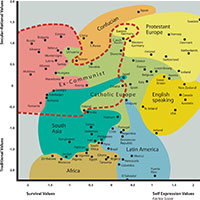 International Conference “The problem of cultural identity in the situation of contemporary dialogue of cultures”
International Conference “The problem of cultural identity in the situation of contemporary dialogue of cultures”
1. Modern and postmodern strategies of identity.
2. The problems of identity in the modern Ukraine.
3. Nationalism in the epoch of supernationality.
4. The identity of Foreign and «foreign» identities in Europe.
5. Topos of the «Small Motherland».
6. The problems of religious identity.
7. The issues of identity and cultural tradition.
This conference is a forum, which provides academics and researchers with the opportunity to assemble and exchange knowledge and insights concerning the cross-disciplinary field of cultural identity. Various aspects, contexts and problems of European and Ukrainian identities are being discussed within the scope of the present conference. We are planning to invite philosophers, theorists and historians of culture, political analysts, sociologists and others whose interests are similar to the general issues considered at the conference. Also it can be used as platform to exchange the results of researches which are conducted by scientists from different field of science and different countries (Ukraine, Poland, Belarus, Georgia, Czech Republic, Greece, Lithuania).
 International Conference “Ukraine and European Values: politics, culture and education”
International Conference “Ukraine and European Values: politics, culture and education”
1. Europe as sociocultural construct: historical, actual and future perspectives.
2. Politics in EU and Ukraine.
3. European cultural policy.
4. Modernization of Ukrainian society
5. The development of Europeanistic educational programs.
This conference is a final forum, which summarizes the results of module and determines the prospects for further scientific, academic and civil activities in field of European studies. Also this event provides academics and researchers with the opportunity to assemble and exchange knowledge and insights concerning the essence of Europe and its values, EU’s – Ukraine relations, establishing the democratic political culture and institutions in Ukraine, developing the Europeanistic educational programs. Also it can be used as platform to exchange the results of researches, which are conducted by scientists from different field of science and different countries (Ukraine, Poland, Belarus, Georgia, Czech Republic, Greece, Lithuania). Expected result of this conference is establishing contacts and partnerships between research groups from different scientific and academic institutions. Also we expect the ideas and declarations about further research and educational projects.
 Workshop “What do the European values matter? Recommendations of the best practices for organizing Europeanistic lessons”
Workshop “What do the European values matter? Recommendations of the best practices for organizing Europeanistic lessons”
In this workshop, schoolteachers will explore the brain and the processes involved with learning. By specifically looking at attention, processing and memory, schoolteachers gain the necessary background information to begin to understand the ways that they learn best. After learning background information in “What does the European values matter?” this workshop will build on that information and will introduce schoolteachers to how they, as an individual, learn specifically. Schoolteachers will complete learning styles, study strategies, and personality inventories, and will leave with a better understanding of how they learn best, and what they can do to encourage effective learning. In this workshop, schoolteachers from Rivne and Khmelnytsky region will receive useful tips on how to create an online course for school pupils about the practical significance of European values. Schoolteachers will receive a roadmap for implementing new teaching practices in the learning process, which they can then use to create a better understanding of the importance of European values.
 Roundtable “Professionalism, ethics, and values of public service: the experience of the EU”
Roundtable “Professionalism, ethics, and values of public service: the experience of the EU”
Discussion block 1. The experience of EU in the field of reforms in public administration and public service.
Discussion block 2. Scientific support for modernization of public service in Ukraine.
Discussion block 3. The issues of high qualification of public servants and cultural tradition.
Discussion block 4. The State Anti-Corruption Policy in the European Union.
This roundtable is a place, which provides administrative and public administrators with the opportunity to assemble and exchange knowledge and insights concerning the reforms in public administration and public service. In this roundtable, we will examine the practice of effective implementation of public service of the EU such as professionalism, ethics and values of public service. We will discuss ways to overcome the corruption in the public service and to assess effective tools to combat the phenomenon of corruption. The primary focus will be on presenting experience of Eastern Europe. Recently, there has been growing interest and discussion of new models for modernization of training, in-service training and advanced training of public servants in Ukraine. Special attention will be paid to the issues of diagnosis and development of management and leadership abilities of public servants in Ukraine the example of the EU.
